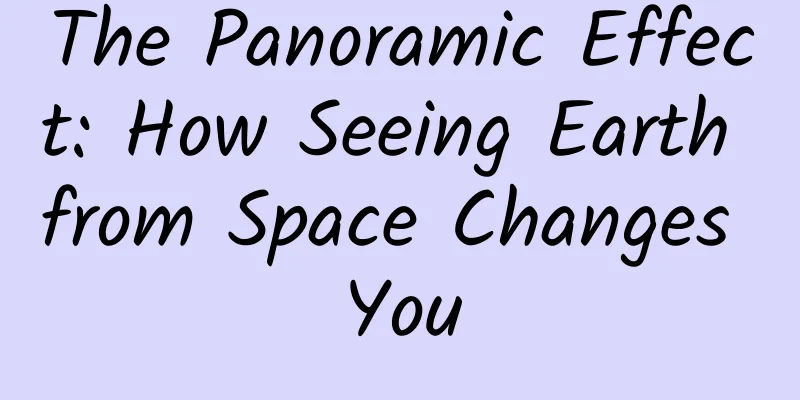The Panoramic Effect: How Seeing Earth from Space Changes You

|
NASA astronaut Bruce McCandless II "floating" above Earth, February 1984. © NASA/Corbis/Getty Leviathan Press: Much of our sense of our insignificance in the universe comes from visual reports of space and the universe in the media age, such as the famous Pale Blue Dot, which inspired Carl Sagan to write Pale Blue Dot: A Vision of the Human Future in Space: Pale Blue Dot: The famous photo of Earth taken by Voyager 1. © wikipedia I believe that most people's reaction after seeing this photo is that the Earth we live on is too small in the face of the universe. As Carl Sagan said, "On this tiny speck, everyone you love, everyone you know, everyone you have ever heard of, everyone, no matter who they are, lives out their lives." More importantly, the Earth is the only place we know of where life is living - once you think of this, especially considering the scale of the universe, many people feel a sense of absurdity and despair. Therefore, the question that the "panoramic effect" wants to ask is: if people have the opportunity to look down at the earth in the near future, will it have a significant impact on their spiritual world? In other words, after seeing this lonely planet from a God's perspective, will people rethink the disputes and disagreements in their daily lives? Actor William Shatner was overwhelmed with emotion when he returned from space for the first time. When the spacecraft landed in October 2021, the 90-year-old stood on a dusty grass in the West Texas desert. Not far away, Jeff Bezos, the billionaire who invited him to take this space trip on a Blue Origin rocket, sprayed champagne, but Shatner seemed to have no focus on celebrating the triumph. Shatner (left) tells Bezos about his space experience. © CNBC He described in a calm tone everything he saw in space, but tears of excitement were already streaming down his cheeks. " The opportunity you've given me is the most significant life experience I can imagine ," Shatner told Bezos. "It's special. Very special. I hope I can recover from this excitement." The veteran actor who played Captain Kirk in "Star Trek" was obviously excited and had a lot of thoughts. The feelings he expressed after returning to Earth were completely unexpected. He actually only stayed in space for 3 minutes. Astronaut Tracy Caldwell Dyson looks out over Earth from the International Space Station. © Particle Scitech Professional astronauts call this phenomenon that occurs in Shatner “the overview effect.” To these space travelers, Earth is just a gleaming planet hanging alone in the blackness of the universe, an oasis of life in the silent void. How can this not inspire awe? “The sight of the Earth from space is so overwhelming that even with all the preparation, nothing can compare to the sensation of it,” Alan Shepard, the first American in space, wrote after his triumphant return from space in 1962. His journey was not unlike Shatner’s nearly 50 years later. © NASA Once in space, the silky clouds, vast continents and oceans all fall below, allowing astronauts to overlook their home from a completely different perspective - and think deeply about humanity's relationship with it. "The Earth has become so small and fragile, a speck in the universe that can be completely covered by your thumb, and it has become even more precious," said Russell "Rusty" Schweickart in a speech in 1974 during the Apollo 9 mission, which orbited the Earth for 10 days. Michael Collins, an astronaut who orbited the moon during the Apollo 11 mission, believes that if politicians from all countries could go to space to experience the panoramic effect, many thorny political differences might no longer exist. “Once in space, national differences that had seemed so important disappeared and the noisy disputes suddenly quieted,” Collins wrote in his memoir, Carrying the Fire. Astronaut Eugene Cernan on the final human mission to the lunar surface in December 1972. © NASA Astronaut Gene Cernan, who was one of only 12 people to walk on the moon, wanted everyone to see what he had experienced. “I wish everyone could see its beauty and its significance,” he said in 1985. “It wouldn’t make the Earth a utopia, but it would certainly change something.” More than 30 years later, space travel is still not affordable for everyone, and there is no trend towards it. However, there are changes. In Cernan's time, only professional astronauts could participate in space travel; now, the space tourism industry is gradually emerging, and a seat on a spacecraft is no longer out of reach - at least for those rich people who can wave astronomical checks. Since the summer of 2021, Blue Origin has sent 31 tourists to the edge of space and darkness. Elon Musk's SpaceX has also served 7 space tourists, 3 of whom have lived on the International Space Station for more than two weeks. The next group of space tourists received by SpaceX will step out of the space capsule and experience a small space walk. © SciTechDaily/SpaceX As commercial space travel becomes more affordable and accessible, we’ll have the opportunity to test Cernan’s hypothesis: Could it be that if enough people experienced the panoramic effect, their lives would be significantly improved and conflicts reduced when they returned to Earth? However, we will also find that after the identities of space travelers have diversified, their descriptions of this experience are also different from those of the previous astronauts. So, when these new generation of space travelers look back at their home planet from outer space, what do they see? *** Frank White coined the term "panoramic effect" in the early 1980s while flying over Earth—although White was high enough to see the Earth in its entirety, but not high enough to reach space. White was working at the Space Research Institute, a nonprofit founded by Princeton physicist Gerald K. O'Neill. O'Neill believes that humans will one day live in a space station with an environment similar to that of Earth. It is worth mentioning that a young man named Bezos once attended O'Neill's lecture as a student and later funded the establishment of Blue Origin, aiming to turn O'Neill's theory into reality. As Frank White flew westward from the East Coast of the United States, over plains, mountains, and deserts, he thought: People living in space always have this panoramic view. As he later wrote, "They can see how everything on Earth is interconnected, and realize that this 'world' that Earthlings care so much about is actually just a small planet in the vast universe." © Tenor To find evidence for his ideas, White began interviewing astronauts to provide a template for future human space residents. By the early 1980s, dozens of astronauts had been to space. Many of them talked about their experiences in interviews or memoirs, but no one had ever stopped to think about the significance of what they had seen. While White found in his interviews that not everyone was changed by what they saw in space, he also found some common themes among the astronauts who were. White introduced this in his book The Overview Effect, first published in 1987. For astronauts who experience the overview effect, their sense of national and ethnic belonging gradually disappears, replaced by a sense of identity as a member of the human race, a feeling of close connection with all of humanity. In addition, these astronauts will also feel a new bond with their home planet - after all, the Earth is the only known planet with life, and without the Earth, the universe would be a barren land - the Earth from the perspective of space is so fragile, and the atmosphere is so thin, it undoubtedly needs our careful care. The idea of the panoramic effect captured the public's imagination, and subsequent books and documentaries about the U.S. space program took the craze to new heights. The public gradually formed the impression that the panoramic effect was a privilege enjoyed by those brave enough to venture into space. Astronaut Walter Schirra gazes into space during the Apollo 7 mission in October 1968. © NASA However, Jordan Bimm, a historian of space exploration at the University of Chicago, believes that the panoramic effect is not only an astronomical phenomenon, but also a cultural phenomenon. This is actually a human story, and its theme is shaped by various earth-related environments. We cannot ignore that the background of the panoramic effect is that NASA astronauts at that time tended to be highly homogenized: they were all white men with engineering degrees and military experience. These astronauts are the product of their years of relevant training. Of course, there is nothing wrong with this. Space travel is a new and dangerous field that requires participants to have strong psychological and physical qualities. On the other hand, these same qualities, which always seemed necessary at the time, also shaped the language astronauts used to describe their experiences in space. As Patricia Santy, a longtime psychiatrist at NASA’s Johnson Space Center, wrote in 1994, “ Astronauts must always project a strong side; showing emotions like sadness or fear is seen by the public as weakness. ” If the sight of Earth trapped in endless darkness caused an astronaut to feel those negative emotions, he would be unlikely to admit it, unless he didn’t want to go on another mission. Moreover, to convey how sacred the space experience is, many astronauts use religious language. “In the universe, you can only see natural boundaries, boundaries created by God,” Cernan said, for example, which reflects another common trait among these astronauts: they are all Christians. Of course, this statement also reflects the Cold War context of the early American space program. “There was a sense of us versus them… After all, we were not communists without God,” Deana Weibel, a cultural anthropologist at Grand Valley State University in Michigan, told me. “God was on our side.” Soviet cosmonauts of the same period also praised the beauty of the Earth from space, but their expressions never mentioned higher powers. The specter of nuclear war also loomed over early space exploration. At a time when the two superpowers, the United States and the Soviet Union, were busy competing for spheres of influence around the world, the idea of a world without borders seemed particularly surprising. To some, this vision represented hope. Schweickart wished he could pull a politician from each side and ask them: "Look at it from this perspective! Look! Are the struggles for power on Earth so important?" Yet others see not a vision of peace but a precursor to destruction. Webel, who interviewed many astronauts (who spoke anonymously) for her research, says one astronaut told her that, looking out the window of a space shuttle at the vastness of the universe and the tinyness of the Earth, “he was absolutely certain that humanity would destroy itself in 500-1,000 years.” Of course, the astronaut never said this publicly. *** The spacecraft that SpaceX sends professional astronauts to the International Space Station is stylish and futuristic. Before the first space travel project, SpaceX added a huge glass window to the spacecraft, which looks like a bulging bubble from the outside. Through this glass dome, tourists can see the entire universe, including their home Earth. SpaceX gave the panoramic effect as a gift to space tourists. © SpaceX So what did the first wave of space tourists (non-astronauts) think when they experienced the panoramic effect? Many of them returned with traditional comments. "It's very moving and it changes you," Sharon Hagle, a philanthropist who also flew on a Blue Origin rocket, told me. "You see the curve of the Earth, you see how clouds form, and you realize how small we are." Some space tourists come back with something different in mind. In 2021, geoscientist and artist Sian Proctor spent a few days in Earth orbit and told me that while she had expected to experience the much-cited sense of connection to Earth, what impressed her most was how bright the planet was. "There's nothing better than going to space, floating in space, and being bathed in the light of the Earth," she said. Proctor is only the fourth African-American woman to travel to space. While orbiting Earth, she paints Earth's natural wonders from the mind of a creator she calls AfroGaia. Hayley Arceneaux, a physician assistant who traveled to space with Proctor, also saw the Earth in a panoramic view from her professional perspective. This reminded her of the challenges of cross-border medical services. "Looking at the Earth from space made me deeply feel that human beings should be a united whole, but it also made me think about how different medical services are in different countries and regions around the world. It's the same Earth, so how can the prognosis of people born on one side be so different from that of people born on the other side?" " From space, I could see all the countries at once, and the sense of inequality became even more acute, an ugliness lurking beneath the beauty, " Assinox wrote in his recently published memoir. Other space tourists describe their experiences in a tone that is nothing like their predecessors. In 2021, veteran pilot Wally Funk went to space with Bezos. "I thought I would see the whole Earth," Funk later said, "but we may not have flown high enough." Millionaire Jared Isaacman, who has also sent himself and three others into space via SpaceX, said he prefers to see the moon rise out of the darkness. "The Earth is what you think it is, a big shiny blue ball." What seemed so new and spectacular to Alan Shepard is now commonplace, and space tourists seem to expect it before they go up to space. As space tourism grows, photos of the shiny blue ball will appear more and more frequently on social media, and eventually become as common as selfies in an infinity pool. Back to Shatner, who did say something similar to his predecessors after his first triumphant return from space, but who also described the experience in a much more negative light, and did so publicly. In his recently published memoir, Shatner wrote that he felt "an overwhelming sadness" as he looked down at Earth. © Best Animations Gifs I called Shatner to ask how his feelings about space travel changed. "I sat alone for hours thinking about the trip, and then I realized that what I really felt was sadness, sadness for the Earth." He told me that before he went into space, Shatner had expected to be overjoyed after seeing the wonders of Earth, but in fact, all he could think about was that such a beautiful planet was in great danger—primarily from climate change. He said that this sadness still haunts him: "Even now, even just talking about it with you, I can cry." Shatner said that for a while, he was able to be more optimistic, but he had recently read an article about the amount of plastic particles in the environment. "You are interviewing me at the time when I am most desperate." *** As powerful as the panoramic effect was, it gradually wore off. Eventually, gravity and earthly responsibilities took over. “Life is always so heavy, but it’s inevitable,” Doug Hurley, a retired NASA astronaut, told me. “Like most people, we have to work, we have to make money, and we have to support our families.” Hurley’s wife, Karen Nyberg, is also an astronaut. I asked her if the couple had discussed in depth how the experience of looking at the Earth from space had changed them. Nyberg replied that they probably had, but they couldn’t remember when or what it was about. Katya Echazarreta, who will go to space with Blue Origin in 2022, told me that she feels a responsibility to share her experience of the panopticon effect, even as its power and impact fade. “I come from a very underprivileged background,” said Echazarreta, the first Mexican American to go into space. “For me, the hardest part is actually how to answer the same question a thousand or ten thousand times and still have that initial excitement.” Chris Cassidy, another retired NASA astronaut, flew into space aboard the space shuttle and saw fires raging in the Amazon rainforest. He told me that the sight reminded him of the severity of the threat of climate change and that it made him “a better earth resident.” However, the experience did not “completely change” him. “I didn’t become a better father, I didn’t become a better friend, I didn’t become a better husband,” Cassidy said. Michael Collins once said, "The ideal three-person crew for the Apollo mission would be a philosopher, a priest and a poet. Unfortunately, letting such a crew fly a spacecraft would undoubtedly be suicide for them." Today, this is no longer a problem. Such a three-person crew can enter the universe without much training, as long as someone is willing to pay for them. However, when they return to Earth, the changes in their thinking brought about by the experience that was originally exclusive to God may be completely different from those in the Apollo era. They may be in awe, despair, or just shrug indifferently. Whether you are a professional astronaut or a space tourist, a trip to space is an assault on your senses and your mind. Millions of years of evolution have allowed humans to live on Earth as we do today, and while we should not confine ourselves to this planet, in a sense, those who have been lucky enough to go into space have witnessed wonders that are not ours, and the feelings they have as a result are bound to be varied. If there is one thing that these experiences have in common, it is that those who go into space for the first time will certainly have an indescribable feeling. Walter Schirra radioed John Glenn from Earth orbit in 1962 (after completing a spacecraft orbiting the Earth earlier that year, a first for humans): "This is all a little hard to describe. Isn't it, John?" By Marina Koren Translated by Jiang Daqiao Proofreading/Sesame filling teeth gap Original article/www.theatlantic.com/magazine/archive/2023/01/astronauts-visiting-space-overview-effect-spacex-blue-origin/672226/ This article is based on the Creative Commons License (BY-NC) and is published by Jiang Daqiao on Leviathan The article only reflects the author's views and does not necessarily represent the position of Leviathan |
<<: Can you see the vortex of Coriolis force in the toilet?
>>: Why do most people prefer meat to vegetables?
Recommend
If they want to "go shopping" during the day, they have to "explode"! The "survival wisdom" of slugs
Produced by: Science Popularization China Author:...
A congenitally blind man can "see" the flying ball without using his eyes
Produced by: Science Popularization China Produce...
The three levels of conversion analysis: do you understand both product and operation?
Conversion analysis is the most core and critical...
The physics giant who defended the molecular theory fell on the eve of dawn...
"He knew that he had the most intelligent mi...
Soul advertising, Soul advertising effect
Soul is a connected social metaverse, leading the...
The movement of particles is certain, so the future world is certain?
© Malte Mueller/Getty Images Leviathan Press: Tho...
Liu Xiaohu's five steps to build a beautiful buttocks with Pilates and Victoria's Secret
Liu Xiaohu's five-step Pilates Victoria's...
One picture to understand | Beijing carries out antigen testing! How to read the "two bars" of the new coronavirus?
Beijing will carry out antigen testing among peop...
Ford Motor: Ford Ranger sales reached 2,402 in January 2024, topping the 150,000+ pickup truck market
According to media reports, Ford Ranger sales rea...
Science and technology are the core combat power! Xi Jinping talks about strengthening the military with science and technology
A strong country must have a strong military, and...
Apple's review has always failed. What should I do to get my application approved?
When you have read a large number of official ema...
Ten rules for open source success
[[151765]] Everyone wants it, and many are trying...
How to turn off the "personalized recommendations" of commonly used apps such as WeChat, Taobao, Bilibili, Weibo, Meituan, Zhihu, etc. (with before and after comparison)
On April 8, according to People's Post and Te...
Financial industry information flow delivery methodology and financial customer delivery cases
The financial industry suffered a severe setback ...
10 insights behind the 120,000 yuan marketing campaign
Holiday campaigns have always been the focus of b...









